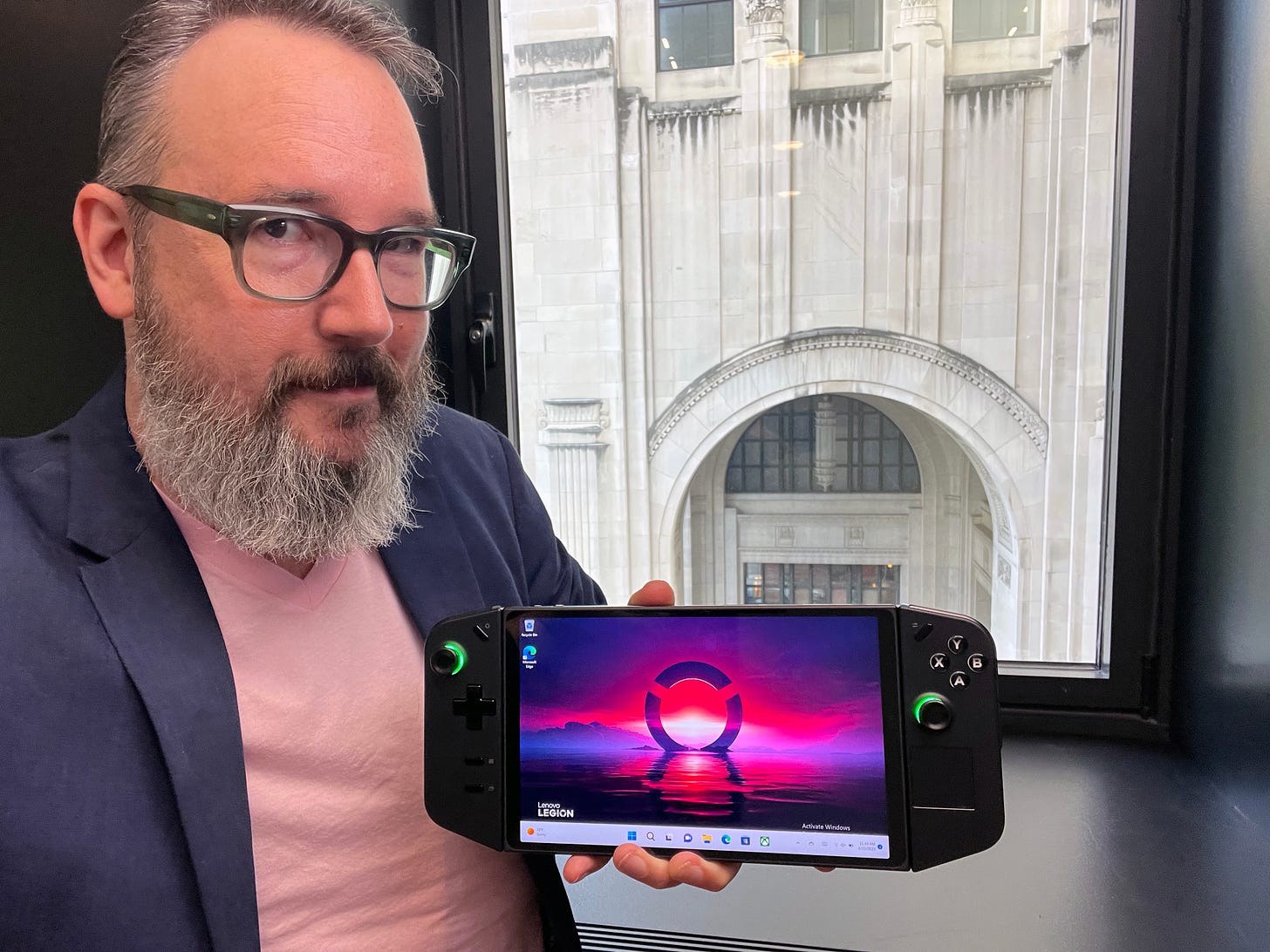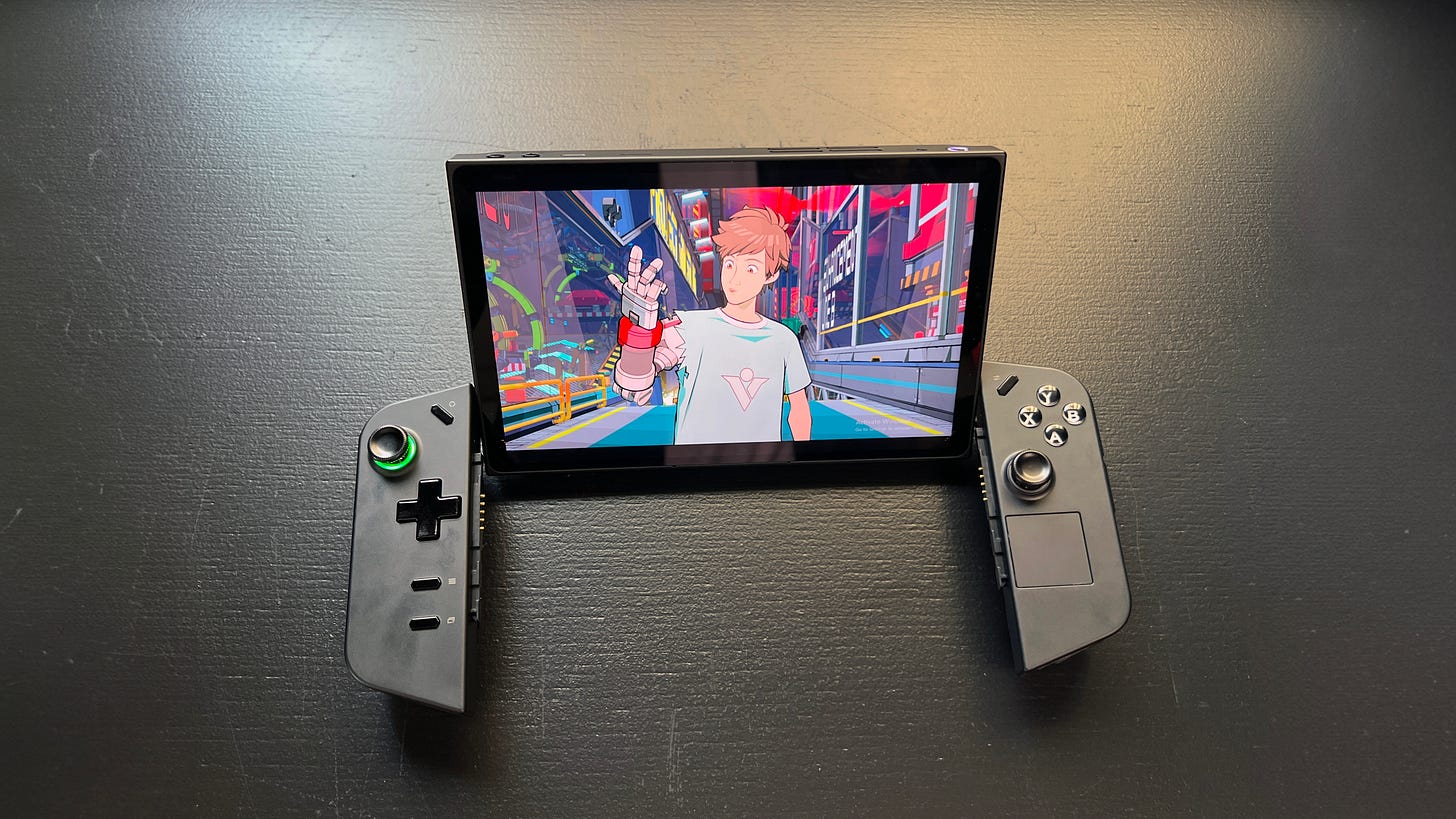Finally, a handheld gaming PC that thinks like a Nintendo Switch
Lenovo's Legion Go Goes Some Unexpected Places
Lenovo's Legion Go Goes Some Unexpected Places
Games and gaming hardware have dominated this space recently, but that's because there's so much interesting stuff, both software and hardware, to think about right now. The latest is the Lenovo Legion Go, a handheld gaming PC that falls into the same category as the Steam Deck or Asus Ally, and is a close cousin to something like the Nintendo Switch.
These devices have gone from cult favorite to genuine mainstream hit -- I'm always surprised by how many people, even non-gamers, know what a Steam Deck is.
I recently got some hands-on time with the Legion Go, and it really feels like it picks up some of the best features from all the other handheld gaming devices. It had a thumb-sized touchpad like the Steam Deck (but just one, on the right side), it runs Windows 11 and has an AMD Ryzen Z1 Extreme CPU like the Asus Ally, and like the Nintendo Switch, the side-mounted controllers pop off.
That means you can set the big 8.8-inch screen up on its built-in kickstand and use the controllers in your hands, which may be more comfortable, depending on what you're playing.
Yes, it's big and bulky, especially compared to the other handhelds I've reviewed, but I appreciate the kitchen sink approach, and since the original Steam Deck hit my hands more than a year ago, I've come to greatly appreciate just how well traditional PC gaming works in this format, including recent games like Baldur’s Gate 3 and Diablo IV.
Here are some deeper dives into the Legion Go from myself and my Gizmodo colleagues:
Lights...for behind your TV
I've got smart light bulbs in most of my lamps, a half-wall of Nanoleaf panels next to my desk, and smart light strips under the kitchen cabinets. What else is left to smartify?
Putting lights behind your TV, sometimes called bias lighting, always seemed like an unnecessary extra step, but after playing around with the Nanoleaf 4D setup, I'm at least more of a believer.
The 4D system consists of a lightstrip, a small webcam-like camera and a control box. Wrap the lightstrip around the back of your TV with adhesive stickers, aim the camera at the screen from either above or below (use below, above is too distracting) and plug everything in together. Then the lights will react to what's on the screen, mirroring movement and color. Sometimes it's very close, sometimes it seems a bit random, but it usually added to the experience, as if the on-screen action was bleeding out onto the wall behind the screen.
For $99, it's cheaper than some other smart bias lighting kits I've seen, and ties into the larger Nanoleaf infrastructure, so if you have other Nanoleaf products, they can all be controlled from one app, and your other light panels can even use the input from the camera to also match the on-screen action.
Do you really need smart backlights for your TV? No. Is it a cool extra that makes a great gift or special indulgence? Yes.
Subscribe to this newsletter for more: danackerman.substack.com. Tech Support with Dan Ackerman is a regular email series from veteran technology reporter Dan Ackerman where I share stories about how technology affects our everyday lives, plus interesting links and news.
Forward or share with your friends, or they can sign up here: danackerman.substack.com
See more at:
Web: danackerman.com
Twitter: twitter.com/danackerman
Threads: threads.net/@danack
TikTok: tiktok.com/@danacknyc
YouTube: youtube.com/danackerman
Instagram: https://instagram.com/danack/
Gizmodo: gizmodo.com/author/danack
Plugs! Buy my book, The Tetris Effect!
“Upends the standard Silicon Valley, Steve Jobs/Mark Zuckerberg technology-creation myth...the story shines” — The New York TimesTechlandia is a modern dungeon crawl adventure where 1-4 heroic tech bloggers infiltrate the high-tech headquarters of the all-powerful Techlandia corporation. The goal: Stop the launch of a new smartphone that just might destroy the world...
“A fun mix of quirky social commentary and Lovecraftian horror.” — Gizmodo





